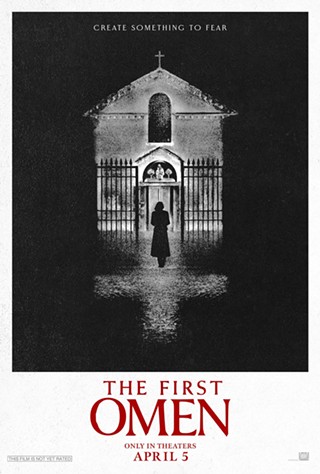THIS WEEK, TWO new films about the loss of sexual innocence arrived in town. While one is a sleazy teen sex comedy and the other an experimental art film, oddly both feature scenes of someone vomiting during sex.
There must be something about vomiting during sex that just sums up the transition from sexual innocence to sexual knowledge. Who hasn't had this conversation:
"Hey, remember the first time you did it?"
"Did what?"
"You knowävomited during sex."
Other than this similarity, it would seem that the films have little in common; but both present ideas about sexuality and the exile from the Edenic world of innocence.
American Pie has been compared to Porky's and the mid-'80s fare one now finds in the "wild comedy" shelf at Lackluster Video.
Pie is pretty much firmly ensconced in that genre, but coming after political correctness had reformed our college campuses and stand-up comics (one thinks of the "growthful" "humor" of Whoopie Goldberg) it has the need to not be what it is. It accomplishes this by taking the standard clichés of its type, then adding speeches that clumsily contradict the message of the film.
The plot revolves around a group of high-school friends who vow to lose their virginity by the end of prom night. Then, for some reason, they start expostulating about how the pressure to have sex is wrong, and that they shouldn't be thinking with their dicks, etc., etc. And then they just go on succumbing to the pressure to have sex and think with their dicks. Other than their brief speeches, there's nothing to indicate their attitude toward getting laid is at all distinct from that of your average teen date rapist.
One of the characters, "Jim," even sets up a video camera to film a female exchange student, without her knowledge, as she undresses, and then broadcasts the tape live over the Internet. Jim experiences no repercussions for his action, but the girl he violates is sent back to her Eastern European homeland when her sponsors hear about the broadcast.
Pie's vomiting-during-sex sequence is another example of a scene that's meant to be funny, but winds up being creepy: a boy, while lying to a girl and pressuring her into having sex, accidentally drinks a semen-laced glass of beer, and winds up puking on his potential victim. There's so many disturbing elements in that scene it would take a three-dimensional graph to chart them, but essentially the idea here -- as in the Internet broadcast sex scene -- is that women must pay for their sexuality. Pie winds up being extremely uncomfortable to watch because of this. For every funny sequence (and there are a lot of them) there's one which is just deeply, unselfconsciously immoral and cruel.
LOSS OF SEXUAL Innocence is, like Pie, about the trauma of sexual awakening; but instead of focusing solely on the teen years, it follows Nic (played by Julian Sands) from his childhood through middle age. His story is broken up by a wordless retelling of the Adam and Eve myth, wherein two naked figures discover their bodies and their surroundings in a strange, sunlit Eden.
While Nic's story is interrupted by the Bible tale, it also interrupts itself, moving backwards and forwards in time. We see his first, unsettling look at sex as he secretly watches an old man ogle a young woman, and then die of a heart attack. There are sequences from his teen years, from his married life, and from his work as a filmmaker in North Africa, but these are not designed to form a narrative.
Rather, these vignettes come together to accentuate the subtle connections between seemingly unconnected events.
At times, secondary characters will become the focus of the film, and then within these sequences silent passersby will steal the spotlight, making even the background figures richly textured. It's an arresting effect, and it makes all the action in the film seem consequential, even though it never amounts to a plot.
In the Adam and Eve sequences, both the actors are of course naked, but through golden lighting and the actors' constantly amazed expressions, director Mike Figgis manages to create a palpable sense that this is the nudity from before the fall, when Adam and Eve found each other's bodies curious and delightful, but had not yet discovered shame. Actions that would be extremely smutty in the wrong context (Adam's erect penis, the couple urinating together) somehow come across as beautiful, strange and new, as though these really are the first people experiencing these things for the first time.
Throughout Loss, lighting, tint and music are used to create mood. There's less than 10 minutes worth of dialogue in this film, but the visuals are so strong they carry the meaning that verbal exposition would have handled in a clumsier film.
It may seem odd to compare Loss of Sexual Innocence with American Pie, but what warrants their contrast is that each deals with the morality of sexual awakening. Loss comments on that morality by questioning the effects of the fall, and how it informs the tensions between men and women. Pie also deals with these tensions, at times quite realistically and sensitively, but it undermines itself by falling back into Neanderthalish ideas about the difference between men and women. Loss sees this difference as indicative of the gap that desire forms between two desiring beings, such that the difference indicates an essential sameness. Both men and women desire and have shame over their desires, and this shared desire and shame is the root of their differences.
Like Loss, Pie is adult enough to understand that we're the same in having desires, but the repercussions for these desires are deeply different. In opposition to the Adam and Eve tale, only the women in Pie are punished, and even exiled, for their actions. In the end, the men return to the Eden of their favorite diner, and speak wistfully about growing up.
Loss of Innocence is playing exclusively at The Loft cinema (795-7777). American Pie is playing at Century El Con (202-3343), Century Gateway (792-9000), Century Park (620-0750) and Foothills (742-6174) cinemas.










